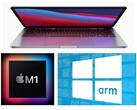Update: The article has been updated following Intel's confirmation that laptops with 720p webcams are eligible for Evo 3 certification as well. Readers may kindly note.
Alongside the launch of the new 12th gen Alder Lake-H processors, Intel also revealed a few improvements to its Evo certification program at CES 2022. When Intel rebranded Project Athena to Evo during the launch of Tiger Lake processors, Intel's Chris Walker told us back then Evo was primarily targeted at laptops with U-series chips.
Evo certification for H-series laptops wasn't actively being considered back then but was still a point of contemplation. Now, Intel Evo, in its third iteration, will cater not only to H-series laptops but to accessories and foldables as well. Desktops, on the other hand, will be seeing their first Project Athena-based designs this year.
Desktops based on Project Athena are mainly focused on business use cases and as such will require the use of vPro equivalents of Alder Lake-S desktop processors. Intel said that Project Athena certification for desktops will focus on privacy, automated user-aware logins, immersive collaboration experiences, and sustainability. OEMs need to ensure that their offerings meet EPEAT standards and offer a good balance between portability and power efficiency.
On the laptop side of things, Evo 3 will require OEMs offering 12th gen Alder Lake SoCs, Wi-Fi 6E, Intel Connectivity Performance Suite for automatic traffic prioritization, Dynamic background noise suppression, an FHD or greater webcam, and, optionally, Intel Visual Sensing.
We have exclusively reported before that Intel would be mandating 8 MP cameras across upcoming Raptor Lake laptops, which would be based on Evo 4. For Evo 3, OEMs are recommended to offer full HD webcams, but Intel also clarified that 720p webcams are fine considering bezel thickness.
Evo 3 considers real-world performance metrics such as proper running of commonly used background apps such as Spotify, Outlook, Slack, Amazon, Google Drive, Facebook, PowerPoint, etc. The laptop should be highly responsive and offer good battery life under these conditions.
Performance laptops powered by Intel Alder Lake-H processors are also eligible for Evo 3 certification. However, these need to offer screen sizes between 15 and 16 inches, good display characteristics that work well for content creation, and more importantly, be powered by Arc discrete GPUs. Intel didn't delve much into the Arc dGPU lineup at CES, but we hope to hear more in the weeks to come.
Intel is also extending Evo to the accessories ecosystem that includes Thunderbolt 4 docks and Bluetooth accessories from the likes of Dell, HP, Anker, Belkin, Poly, Sabrent, Samsung, and more.
Finally, Evo will also cater to laptops with foldable displays. The Foldable Display Spec will satisfy all Evo 3 requirements while also catering to large screen foldables later in 2022.
Check out the slides from Intel's briefing below.
Source(s)
Intel CES 2022 Press Brief































